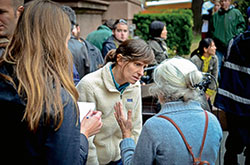 |
 |
| current issue |  |
past issues |  |
send a letter/news |  |
address update |  |
advertise |  |
about us |  |
alumni home |
A River Rolled Through It
Page 5 of 6
Previous | Next
|
The job has kept her jumping from its first week, when a small plane and a sightseeing helicopter collided and crashed into the river near the Hoboken piers, killing nine people. Suddenly the new acting mayor faced a phalanx of media microphones. She took a deep breath, stepped up, and simply said what she knew. Somehow she wasn't nervous at all. The challenges kept coming. The hospital went bankrupt. The city's former parking director and a contractor were convicted of stealing more than $1 million in coins from parking meters. Hirings, firings, lawsuits and union contracts spawned protests and angry blog posts. The loudest criticism centered on the annual St. Patrick's Day parade, which organizers grudgingly canceled last year after Zimmer asked that it be moved to a weekday. ("It's been a puke-fest and a complete drunk-fest," she later explained to The New York Times.)
Oh, and don't forget the shipworms. Strange, eel-like clams, shipworms have proliferated as the Hudson River has grown cleaner. They spend their days boring through wood—a major problem in a city that long ago expanded onto wooden piers. In the last few years, parts of a park and a street have collapsed into the river, undermined by a Swiss cheese of shipworm tunnels. What else can't she see, Zimmer wonders. How many businesses took shortcuts on mold prevention before reopening? How many people are living in unsafe places they couldn't afford to repair properly after the storm? One reason Zimmer loves being mayor is the same reason she loved rowing crew: It's almost too hard to master. But if anything keeps her up at night, it's the city agenda items written in invisible ink, the worries she doesn't yet know to worry about. Hoboken knows how to rebound; it's been down before. By the 1970s, dust had accumulated on the city's various claims to fame: Resort in the early 19th century. Site of the first organized baseball game, at Elysian Fields, in 1846. Departure point for two million soldiers in World War I. Birthplace of Frank Sinatra. Major manufacturing center, with 250 factories at its height. Location for the film "On the Waterfront." Long before Maxwell House, the last of the giants (largest coffee factory in the world and largest employer in Hoboken), moved away in 1992, the city's economy needed a caffeine fix. Meanwhile, across the Hudson, the real estate bubble was pushing young professionals farther afield to hunt for affordable housing. Hoboken's brownstones started to look attractive. A club named Maxwell's was booking indie rock acts even more cutting edge than those in New York, and like the rents, Hoboken's prices for drinks and entertainment were lower. Hoboken was cool again. Musicians and artists moved first, and others followed. The factories became condos. Unusual shops and more than 100 bars and restaurants opened in the city's square mile. PATH traffic moved both ways: commuters to Manhattan, shoppers and nightlife-seekers to Hoboken. Until Sandy. Without the train, few people came to Christmas shop or bar hop, and even businesses that hadn't flooded were hurting. |
blog comments powered by Disqus


